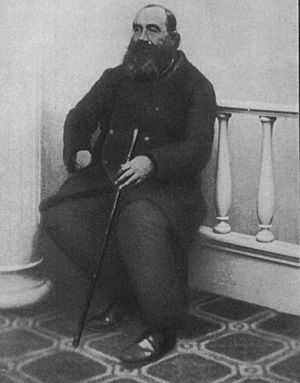Jakob Lorber facts for kids
Jakob Lorber (born July 22, 1800 – died August 23, 1864) was a special Christian thinker and visionary from a place called Styria. He believed in a wide-reaching love from God for everyone. He called himself "God's scribe" because he wrote down messages he believed came from God.
He said that on March 15, 1840, he started hearing an "inner voice" from his heart. From then on, he wrote down everything the voice told him. By the time he died 24 years later, he had written enough to fill more than 10,000 printed pages.
His writings were published after his death and were called a "New Revelation." Today, the "Lorber movement" is a group of people who follow these new teachings. They are mostly active in German-speaking Europe. Parts of Lorber's writings have been translated into over 20 languages. His followers usually stay within their own churches and do not form a separate group or cult.
Contents
Jakob Lorber's Life Story
Jakob Lorber was born in a small village called Kanischa. This village was in the Duchy of Styria, which is now part of Slovenia. His family were farmers.
He was trained to be a village teacher. People who knew him said he was a simple and kind person.
How Lorber Wrote His Books
Many educated men from the city of Graz watched Lorber as he wrote. These included doctors, the mayor of Graz, and famous artists. They all agreed that he lived a very simple life. Lorber was open about his writings. However, some people tried to prove he was faking it. For example, one friend's wife thought he was secretly studying books. But she only ever found one book in his home: the Bible.
His Musical Talent
Jakob Lorber was also very musical. He learned to play the violin. He even took lessons from the famous violinist Niccolò Paganini. Once, he gave a violin concert at the La Scala Opera House in Milan, Italy.
In 1840, the same year he started hearing the inner voice, Lorber was offered a job. It was to be an assistant music director at a theater in Trieste. But he said the inner voice told him to turn down the job. Instead, the voice told him to live a quiet life and focus on writing. Lorber's writings show that the inner voice spoke as if it were Jesus Christ himself.
The Great Gospel of John
One of Jakob Lorber's most important works is The Great Gospel of John. In this book, Jesus Christ is the narrator. He explains that he created the universe. He says he did this to hold back Satan and to be able to become a human. He wanted to inspire his children, who could not see him in his original spirit form.
Creation and Evolution
The book describes how the Earth was created over long periods of time. This description is similar to the modern idea of evolution. It explains how life developed up until thousands of years ago. At that point, Jesus placed Adam on Earth. The book says there were already human-like creatures on Earth. But these creatures did not have free will; they were just the smartest animals.
Free Will and Heaven
The Great Gospel of John always highlights how important free will is. It says that heaven and hell are not just places. Instead, they are conditions that are already inside us. These conditions depend on whether we live in a way that agrees with God's plan or against it.
Writing the Gospels
The book also says that the Gospel of John and Gospel of Matthew were written when the events happened. For example, Lorber writes that Jesus told Matthew to take notes during the Sermon on the Mount. This is different from what many Bible scholars believe today. Scholars usually think Matthew's Gospel was written some years after Jesus's resurrection. They think John's Gospel was written even later. However, The Great Gospel of John explains why this seems different. It says that many writers named Matthew wrote about Jesus over many years.
Paul's Lost Letter
Lorber also claimed that in 1844, his inner voice gave him a "lost" letter. This was a letter that the Apostle Paul supposedly wrote to the church in Laodicea. The Bible mentions this letter in Colossians 4:16.
Many old texts claim to be this "lost" letter. One short text was found in old Latin Bibles from the 6th century. Another was linked to a person named Marcion. However, most scholars agree that these old "lost" letters are not real. The Council of Florence in the 1400s even said they were not part of the official Bible.
The letter Lorber wrote down from his inner voice is very different from any of these old texts. The publisher of Lorber's version says that the letter was lost because the Church moved away from true Christianity.
See also
 In Spanish: Jakob Lorber para niños
In Spanish: Jakob Lorber para niños
 | Shirley Ann Jackson |
 | Garett Morgan |
 | J. Ernest Wilkins Jr. |
 | Elijah McCoy |


